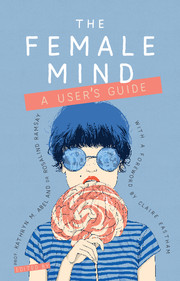Book contents
- Frontmatter
- Acknowledgements
- Contents
- Foreword
- Introduction: being female
- Part I Women in perspective
- Part II Women and society
- Part III Women and their environment
- Part IV Women and specific disorders
- Part V Women and treatment
- 33 What women want from medication
- 34 What women want from services: a patient's perspective
- 35 Complementary and alternative therapies
- Contributors
- Index
35 - Complementary and alternative therapies
from Part V - Women and treatment
Published online by Cambridge University Press: 02 January 2018
- Frontmatter
- Acknowledgements
- Contents
- Foreword
- Introduction: being female
- Part I Women in perspective
- Part II Women and society
- Part III Women and their environment
- Part IV Women and specific disorders
- Part V Women and treatment
- 33 What women want from medication
- 34 What women want from services: a patient's perspective
- 35 Complementary and alternative therapies
- Contributors
- Index
Summary
Complementary and alternative therapies are popular all over the world. Some complementary therapies, such as certain herbal remedies and acupuncture, are thousands of years old. But we still know comparatively little about most of them, because systematic research has only become available in the past few decades.
Effective, safe, both or neither?
Some complementary therapies are more effective than others. It is difficult to lay down hard-and-fast rules of what to use, how and when. For instance, herbal remedies come in many varieties, including alcoholic or watery plant extracts or teas. In contrast to most conventional medications, we often do not know the therapeutically active ingredient in a complementary therapy, or even if there is one. This makes it difficult to work out a dose. In addition, the fact that complementary therapies are natural does not automatically mean they are safe. Opium is natural, and so is deadly nightshade. Complementary therapies can have side-effects and interact with other medicines.
Complementary therapies women might use
The number of complementary therapies is so vast that reviewing or even touching on all is beyond the scope of this chapter. We will focus on herbal remedies and supplements, and look at some examples concerning:
• depression
• anxiety and insomnia
• premenstrual syndrome (PMS) and the menopause.
Complementary therapies for depression
The following therapies all target serotonin, a natural ‘feelgood’ chemical produced by the brain. Remedies targeting serotonin can trigger manic symptoms in some people, so women with bipolar disorder should avoid them. Also, women should not combine such remedies with other antidepressants, because the combination might produce too much serotonin.
St John's wort (hypericum perforatum)
The main use of St John's wort is as an antidepressant. It is also a sleeping aid and a remedy for anxiety. It is one of the few wellstudied complementary therapies and there is evidence of its effectiveness in the treatment of mild and moderate depression (Apaydin et al, 2016). However, if a woman is severely depressed or suicidal, she is likely to need conventional medicines. St John's wort is generally well tolerated, but it can interact with many other medications and make them less effective. For instance, St John's wort decreases the effectiveness of the contraceptive pill, so women taking both should take further precautions against pregnancy.
- Type
- Chapter
- Information
- The Female MindUser's Guide, pp. 231 - 237Publisher: Royal College of PsychiatristsPrint publication year: 2017



